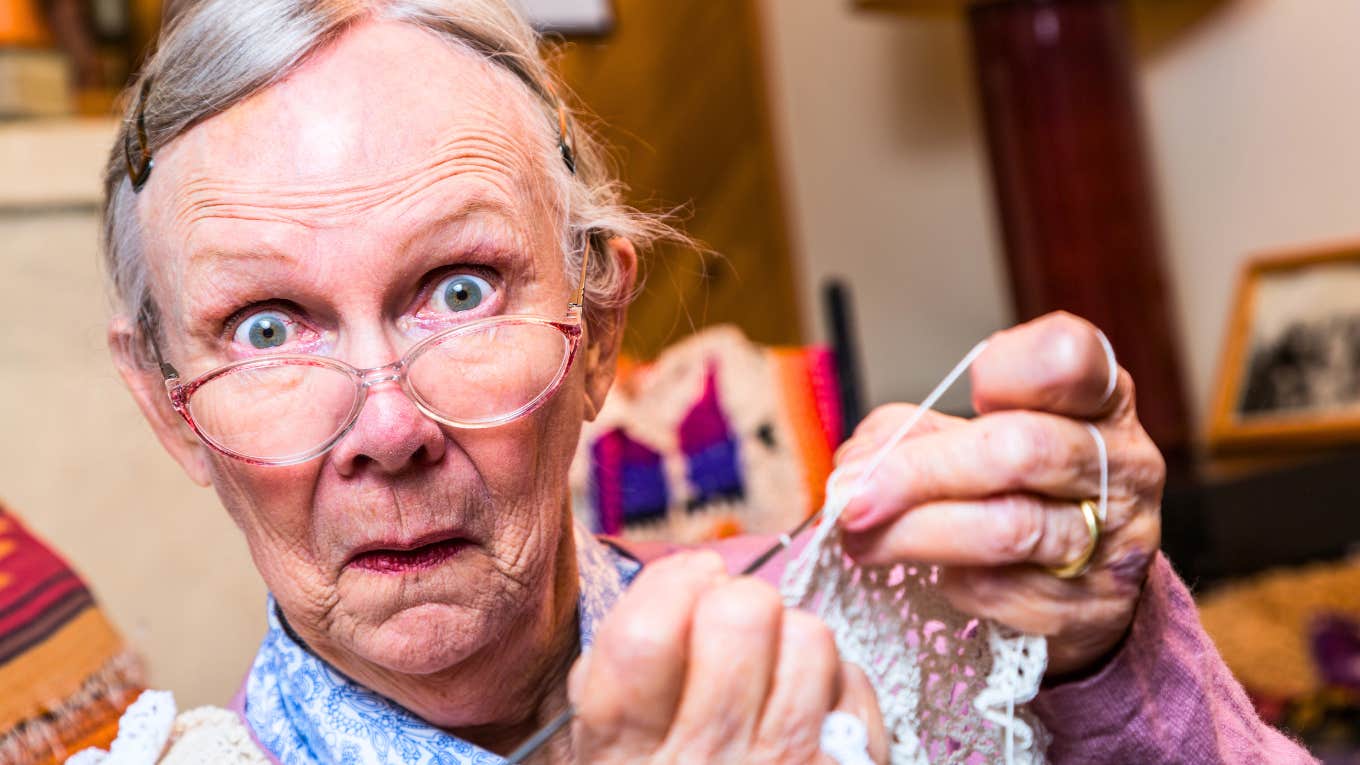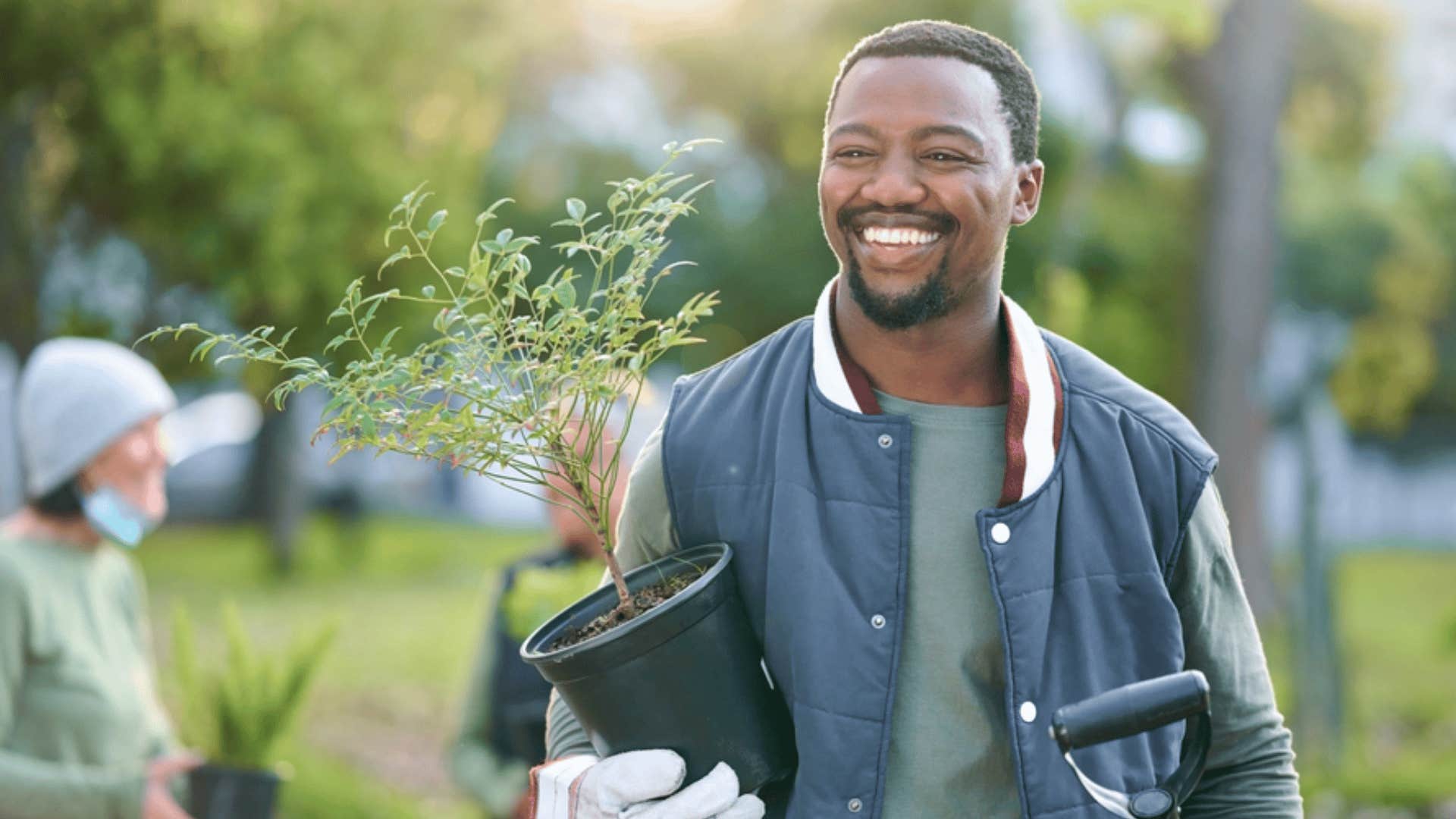11 Grandma Hobbies That Actually Calm An Overstimulated Mind
You don't have to be a grandma to get enjoyment from these calming activities.
 CREATISTA / Shutterstock
CREATISTA / Shutterstock Those of us who are often overwhelmed and overstimulated would take any and all measures just to silence that constant buzzing in our heads for a moment. Thankfully, there are a variety of 'grandma hobbies' we can engage in that will calm our chattering minds and provide us with an outlet to release our energy. While some may view these pastimes as outdated and prefer scrolling through social media, they can work wonders when you can't stop your mind from racing.
So if you find yourself often stressed out and struggling to find an activity that will reduce your anxious feelings, give one of these old but new-to-you activities a try.
Here are 11 grandma hobbies that actually calm an overstimulated mind
1. Knitting
 Elizareta Elesina | Shutterstock
Elizareta Elesina | Shutterstock
While it may be the most ‘grandma’ activity you can think of, knitting can have profound, soothing effects on the mind. Its repetitive, rhythmic motions can induce a meditative state, promoting relaxing and reducing stress and anxiety that often comes with an overstimulated mind.
Research suggests that knitting allows the brain to fall into a deep sense of concentration, pattern recognition, and problem solving, easing any wandering anxieties that have been plaguing the mind.
In a survey of 3,500 passionate knitters conducted by Physiotherapist Betsan Corkhill, 81% of respondents said they felt happier during and after knitting, and 54% of the respondents who were clinically depressed claimed that knitting made them feel happy or very happy.
2. Puzzles
 Pixel-Shot | Shutterstock
Pixel-Shot | Shutterstock
Whether it be small jigsaws or a 500-plus piece puzzle depicting a mountain, putting together and solving puzzles can help people disconnect from everyday stress. Engaging in puzzle solving requires deep focus and attention to detail, ensuring that people are fully present in the moment.
The art of puzzle solving often induces a state of “flow” in the mind, where individuals become fully immersed in the activity, often losing track of time and letting go of their typical worries.
“Focusing such that your mind is occupied but not excessively challenged is incredibly helpful for people with depression, anxiety, and stress, as the activity offers a little holiday from yourself,” trauma therapist Olivia James said about puzzle solving.
The next time you're feeling stressed or overstimulated, reaching for any puzzles you have on hand might be the perfect remedy!
3. Coloring books
 fizkes | Shutterstock
fizkes | Shutterstock
While this may seem more like a little kids activity than a grandma one, coloring books can be incredibly calming. Simple acts, like coloring, takes attention away from yourself and everything that may be stressing you out, forcing you into the present moment.
“Adult coloring requires modest attention focused outside of self-awareness,” clinical psychologist Scott M. Bea, PsyD, told the Cleveland Clinic.
“It’s a simple activity that takes us outside ourselves in the same way, cutting the lawn, knitting or taking a Sunday drive can all be relaxing,” he said.
Since coloring books were something that many of us did to keep ourselves occupied as children, many of us find comfort in returning to the activity as adults.
4. Crossword puzzles
 ALPA PROD | Shutterstock
ALPA PROD | Shutterstock
Similar to jigsaw puzzles, crossword puzzles require your complete focus, blocking out the rest of the world and the worries that inhabit it. It’s a great form of mental exercise, like meditation and other relaxation techniques, promoting a sense of Zen and tranquility. Crossword puzzles can also make you happy in ways you wouldn’t expect.
When you successfully solve words in the puzzle, the satisfaction triggers the release of dopamine, a neurotransmitter associated with pleasure and reward, that enhances a sense of happiness and relaxation.
5. Birdwatching
 PeopleImages.com - Yuri A | Shutterstock
PeopleImages.com - Yuri A | Shutterstock
Like knitting, this is classified as one of the most “grandma” activities you can possibly engage in. While we may make fun of our elders for getting such enjoyment from watching birds, we may find that it brings us a sense of calmness we can’t get anywhere else.
Birdwatching encourages mindfulness, a connection with nature and a momentary break from everyday stressors. The act of attempting to spot and identify birds provides a great mental workout, enhancing concentration and focus. You can even turn it into a fun little game, giving yourself points every time you spot a particular kind of bird!
Even if it may seem like an unusual activity, bird watching allows you a much-needed break from everyday life and the opportunity to enjoy all of what mother nature has to offer.
6. Cooking or baking
 Ground Picture | Shutterstock
Ground Picture | Shutterstock
One of the few things better than tasting delicious food is creating it. There’s nothing more therapeutic than baking your favorite dessert in your kitchen, filling the air with its delightful aroma.
Cooking and baking is a great form of self care, allowing people to focus on creating something that will nourish them rather than cause them further stress. A 2016 study published in The Journal of Positive Psychology found that creative activities, such as cooking and baking, positively impacted peoples’ moods and gave them something to look forward to.
7. Watching clouds pass by
 originalpunkt | Shutterstock
originalpunkt | Shutterstock
Sometimes the most seemingly boring hobbies are the most rejuvenating. Lying in the grass on a nice day and counting clouds as they pass by can be incredibly soothing for the mind. It doesn’t require a strenuous amount of effort, and gives you something else to focus on besides the stressors of everyday life.
The best part about watching clouds pass by is that anyone can do it! All you need is the sky.
8. Watching fish in an aquarium
 NDAB Creativity | Shutterstock
NDAB Creativity | Shutterstock
Whether it’s your own personal fish tank at home or your local aquarium, taking a moment to appreciate the gentle movement of the fish and the rhythmic flow of water urges mindfulness, giving you a temporary rest from all of the worries and negative thoughts.
The visual stimulation different types of fish provide can also be soothing, allowing you an escape from the fast-paced, overstimulating environment around you. And just for a moment, we can imagine what life would be like as a fish in an aquarium, where all they need to worry about is keeping their fins moving.
9. Painting
 Kenchirol68 | Shutterstock
Kenchirol68 | Shutterstock
They say that art is a form of expression. Painting provides us a non-verbal outlet for emotions, allowing us to openly express our feelings that may be difficult to articulate through words.
For some people, painting is an ideal form of healing from some of their greatest pain and worries. For others, it is a healthy distraction from everything in life that can be overstimulating. Some research even suggests that creative arts like painting help us cope with health problems such as anxiety and depression.
In moments of stress, don’t hesitate to pick up the paint brushes and hit the canvas!
10. Gardening
 PeopleImages.com - Yuri A | Shutterstock
PeopleImages.com - Yuri A | Shutterstock
Even if you may get dirty, gardening can provide you with a great sense of joy and satisfaction. The act of nurturing plants and watching them grow can provide you with a sense of pride that makes all of your worries seem small.
For women especially, gardening is said to be a helpful tool when it comes to combatting stress. A study published in PLOS ONE found that gardening activities lowered stress, anxiety, and depression in healthy women.
This doesn't mean that it won’t yield similar results in men. Gardening knows no gender, and can be a healthy escape from reality for everyone!
11. Creative writing
 Juice Flair | Shutterstock
Juice Flair | Shutterstock
While some of us may read our favorite genre of books to escape reality, writing can provide us with the same escape! Immersing yourself in a fictional world of creating new ideas lets your mind temporarily leave behind real-world stressors, offering a mental reset.
You may even find that writing can help you through your own personal conflicts and worries. Creatively writing different stories offers you unique perspectives, leading to a sense of clarity and resolution in your own life.
Megan Quinn is a staff writer with a bachelor's degree in English and a minor in Creative Writing. She covers news and lifestyle topics that focus on justice in the workplace, personal relationships, parenting debates, and the human experience.

